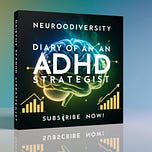The Paradox of Rest
Alex stared at the meditation cushion with a mixture of frustration and defeat. As a tech startup founder with ADHD, they'd been told countless times that meditation was the answer to their constant stress and racing thoughts.
Yet another morning of attempting to "clear the mind" had ended with Alex feeling more agitated than before.
The stillness that supposedly brought peace to others seemed to amplify every thought, sensation, and worry in Alex's hyperactive brain. "Maybe I'm just not built for relaxation," they thought, reaching for their fourth coffee of the day.
This struggle isn't unique. For the estimated 4-5% of adults with ADHD and the millions of high-achieving entrepreneurs pushing their ventures forward, traditional relaxation techniques often feel like recipes for more internal chaos.
While others find peace in stillness, many neurodivergent individuals and driven entrepreneurs discover that conventional methods leave them feeling guilty, frustrated, and even more stressed.
Breaking It Down: What's This All About?
Relaxation isn't just about feeling good—it's a critical biological necessity that allows our nervous systems to recover from stress and operates as essential maintenance for our cognitive functions.
Yet for those with ADHD and entrepreneurs, the standard approaches to relaxation—sitting still, clearing the mind, passive activities—often work against their natural neurological and psychological wiring.
This isn't a personal failure. It's a mismatch between conventional wisdom and the unique needs of brains that thrive on stimulation, engagement, and sometimes even a certain level of productive challenge.
Why This Matters
The inability to effectively relax isn't just an inconvenience—it creates a dangerous cascade of consequences.
For individuals with ADHD, chronic stress exacerbates core symptoms like distractibility and emotional dysregulation, creating a vicious cycle where rest becomes increasingly difficult just when it's most desperately needed.
For entrepreneurs, the cost is equally steep. The entrepreneurial journey inherently involves uncertainty, risk, and high stakes that trigger the body's stress response.
Without effective relaxation strategies, entrepreneurs face increased risks of burnout, impaired decision-making, reduced creativity, and ultimately, the potential failure of ventures.
Consider what's at stake: your mental health, your cognitive performance, your relationships, and for entrepreneurs, the very success of the businesses you've poured your heart and soul into.
Learning to relax effectively isn't a luxury—it's a critical investment in your sustainable success.
The Science Behind It
Research reveals why traditional relaxation methods often fall flat for these populations. Individuals with ADHD frequently show dysfunction in the prefrontal cortex (PFC), the brain region responsible for executive functions and emotional regulation.
While neurotypical brains show increased PFC activity during concentration, ADHD brains often show decreased PFC activity.
This neurological difference not only impacts task focus but fundamentally impairs the ability to intentionally quiet thoughts and achieve a calm state.
Add to this the increased "background noise" in ADHD brains, and the picture becomes clear: quiet environments don't naturally allow these brains to power down comfortably.
For entrepreneurs, the challenges are equally rooted in neurobiology. The chronic stress of entrepreneurship triggers persistent activation of the sympathetic nervous system—our "fight or flight" response.
This state of heightened arousal makes it physiologically difficult to shift into the parasympathetic "rest and digest" mode necessary for true relaxation.
Studies also highlight psychological barriers specific to these groups. Many with ADHD experience intense guilt associated with rest due to years of struggling with focus and productivity.
Similarly, entrepreneurs often internalize "hustle culture," associating constant work with success and viewing rest as a sign of weakness.
Making It Work: How to Apply This in Real Life
The good news? Effective relaxation doesn't require forcing yourself into a meditation cushion. Instead, it means working with your unique neurological profile to find approaches that naturally facilitate calm. Here are evidence-based strategies tailored to ADHD brains and entrepreneurial minds:
✅ Harness Hyper-Focus –
Instead of fighting against the intense concentration that characterizes ADHD, channel it toward activities that naturally absorb your attention. Creative hobbies, solving interesting problems, or engaging with special interests can induce a relaxed state through deep engagement rather than forced mental emptiness.
✅ Move to Calm –
For bodies and minds designed for motion, stillness can feel torturous. Walking meditation, yoga, dance, or even fidgeting during relaxation can provide the movement necessary to paradoxically help the mind settle. The key is rhythmic, predictable movement that doesn't require excessive mental planning.
✅ Create Sensory Sanctuaries –
Many with ADHD have heightened sensory sensitivities that can be leveraged for relaxation. Weighted blankets, calming sounds or music, aromatherapy, and visual aids like lava lamps provide soothing sensory input that helps regulate an overstimulated nervous system.
✅ Frame Rest Strategically –
For entrepreneurs, positioning relaxation as a performance-enhancing tool rather than indulgence can overcome resistance. Research shows well-rested entrepreneurs make better decisions and identify opportunities more effectively—making relaxation a strategic business investment.
✅ Integrate Rather Than Separate – Rather than viewing relaxation as something that happens outside of your workday, find ways to build rejuvenating moments throughout your schedule. Brief movement breaks, moments of mindful breathing, or short periods of engaging with something enjoyable can prevent stress from accumulating intensely.
Real-Life Examples in Action
Sarah, a marketing agency owner with ADHD, struggled with traditional meditation but discovered that 20 minutes of painting while listening to instrumental music put her in a deeply relaxed state.
The combination of creative expression, focused attention on color mixing, and rhythmic brush strokes naturally quieted her racing thoughts without requiring her to sit perfectly still.
"I used to beat myself up for not being able to meditate properly," she explains. "Now I realize my brain relaxes differently.
After my painting sessions, I feel that same refreshed clarity others describe from meditation, but I got there through engagement, not emptying my mind."
Michael, a serial entrepreneur, incorporated "thinking break outs" into his day—scheduled 15-minute periods where he steps away from immediate tasks and allows his mind to wander while walking around his office building.
"I frame these as strategic innovation time, not just breaks," he says. "Some of my best business insights have come during these periods when my brain isn't forced to focus on immediate tasks.
I return to work refreshed and often with solutions to problems I wasn't even consciously working on."
Entrepreneur and ADHD coach Jamie transformed his approach to relaxation by replacing evening television—which left him feeling drained—with rock climbing sessions three times weekly.
"The combination of physical challenge, problem-solving, and complete focus puts me in a flow state that's both exhilarating and deeply calming," he shares. "I sleep better on climbing nights and my anxiety levels have dropped by at least half."
Pro Tips & Insider Insights
🧠 Schedule relaxation like meetings –
Block non-negotiable time for rejuvenation activities and treat them with the same commitment as you would client appointments or important business meetings. This prevents relaxation from being continuously postponed.
🧠 Use body doubling –
For those with ADHD, having someone else present (virtually or physically) while engaging in relaxation activities can help maintain focus and reduce the tendency for the mind to wander to tasks or worries. The presence of another person provides accountability and anchoring.
🧠 Implement clear work/relaxation boundaries –
Create distinct environmental cues that signal to your brain when it's time to shift modes. This might include physical spaces, clothing changes, specific music, or simple rituals that help transition between work and recovery time.
🧠 Leverage technology mindfully –
Apps like binaural beats generators, heart rate variability trainers, and guided active meditation programs can provide structure and feedback that keeps the ADHD brain engaged while promoting relaxation. Technology becomes a tool, not a distraction.
🧠 Experiment systematically –
Create a "relaxation experiments" log where you track different techniques and their effects. Rate each method on factors like enjoyment, difficulty, and how refreshed you feel afterward. This transforms finding effective relaxation into a fascinating project.
Key Takeaways
🔹 Traditional relaxation methods often fail ADHD individuals and entrepreneurs due to neurological differences and psychological barriers
🔹 Movement-based relaxation like walking meditation and yoga can be more effective than stillness-based approaches for active minds
🔹 Creating sensory-rich environments with tools like weighted blankets and calming sounds helps regulate overstimulated systems
🔹 For entrepreneurs, framing relaxation as a strategic performance tool overcomes guilt and productivity concerns
🔹 Both groups benefit from personalized approaches that work with, rather than against, their unique neurological profiles
Further Reading (Books & Resources)
📖 The Mindfulness Prescription for Adult ADHD: An 8-Step Program for Strengthening Attention, Managing Emotions, and Achieving Your Goals by Lidia Zylowska, MD – Amazon Link
📖 Burnout: The Secret to Unlocking the Stress Cycle by Emily Nagoski PhD and Amelia Nagoski DMA – Amazon Link
📖 Flow: The Psychology of Optimal Experience by Mihaly Csikszentmihalyi – Amazon Link
📖 The War of Art: Break Through the Blocks and Win Your Inner Creative Battles by Steven Pressfield – Amazon Link
Practical Tools & Apps
🔧 Calm – Meditation app with movement meditations and sleep stories – Website Link
🔧 Sensate – Vagus nerve stimulation device for stress relief – Website Link
🔧 Focus@Will – Productivity music based on neuroscience to enhance focus and relaxation – Website Link
🔧 Insight Timer – Free meditation app with specific practices for ADHD – Website Link
🔧 Focus Bear – ADHD-friendly task management with built-in break reminders – Website Link
Research & Studies Section (Citations & Sources)
Mindfulness Meditation Training for Attention-Deficit/Hyperactivity Disorder in Adulthood: Current Empirical Support, Treatment Overview, and Future Directions - PubMed Central
The Connection Between ADHD & Anxiety - Fremont Hospital
Mental Health and Entrepreneurship: Managing Stress, Anxiety, and Burnout - Fearless Fund
Hyperfocus: When ADHD Works In Your Favor - Themba Tutors
Six Entrepreneur-Recommended Tips For Achieving A Creative Flow State - Forbes
Unveiling the Best Meditation Types for Hyperactive ADHD in 2025 - Focus Bear
Discover the Top Sensory Calming Techniques: Grab The Complete Checklist - Neurodivergent Insights
8 Evidence-Based Relaxation Techniques for Calming Your Nervous System - Neurodivergent Insights
How to Manage Stress as an Entrepreneur - Sukha
Building Community: The Benefits Of An ADHD Support Group - BetterHelp
What Now?
Finding relaxation strategies that work for your unique brain isn't just about feeling good—it's about creating sustainable success and wellbeing that allows you to thrive. Start experimenting with these approaches today, paying attention to what naturally helps your system downshift into a calm state. Remember that effective relaxation might look different for you than for others, and that's not just okay—it's perfectly normal.
🎧 For more insights, check out this Diary of a ADHD Strategest podcast:













Share this post